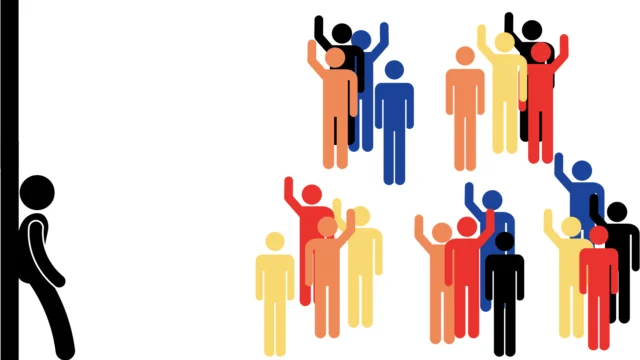
Whether you’re leading a workshop, teaching a class, or simply trying to help people engage more meaningfully, this question strikes at the heart of what it means to facilitate learning. And the answer often begins with a radical act: stepping aside.
The other day, while rummaging through my collection of articles about group work, I stumbled on two gems—both from 2015—that exemplify this idea beautifully. They’re powerful reminders that sometimes the best thing we can do is…less.
The Silent Professor
Hat tip to Alfie Kohn for pointing me to this first one, written by Joseph Finckel, a professor in the English department at Asnuntuck Community College. He writes:
‘I teach English, and midway through the spring 2013 semester, I lost my voice. Rather than cancelling my classes, I taught all my courses, from developmental English to Shakespeare, without saying a word. Though my voice had mostly returned by Tuesday evening, what I was observing compelled me to remain silent for the remainder of the week. My experience teaching without talking proved so beneficial to my students, so personally and professionally centering, and so impactful in terms of the intentionality of my classroom behavior that I now “lose my voice” at least once every semester…
…Teaching without talking forces students to take ownership of their own learning and shifts the burden of silence from teacher to student. It also forces us to more deliberately plan our classes, because we relinquish our ability to rely on our knowledge and experience in the moment.
At the end of a class during which I did not speak, a student remarked that it had been the best discussion she had yet had. Take the pressure off of yourself to teach, and instead create a situation in which learning will occur. If that means remaining silent, don’t worry—you will not have lost your voice.’
—Joseph Finckel, The Silent Professor
As someone who spent ten years teaching college and four decades facilitating groups, I still catch myself talking too much. It’s a deep-seated habit—and a hard one to break. But Finckel’s approach is a powerful reminder: silence can be one of the most generous and transformative gifts we offer learners.
His advice, “Take the pressure off of yourself to teach, and instead create a situation in which learning will occur,” deserves a place on every teacher’s wall.
The Magic of the Raised Hand
This next example comes from Chris Corrigan, a gifted facilitator, teacher, and steward of the Art of Hosting. It’s elegant, simple, and radical:
‘In the second before you let people get to work you ask the group a question: “Put your hand up if you have enough clarity from the instruction I just gave to get down to work.” Many, many hands should go up. Invite people to keep their hands up, and then utter these magic words.
“If any of you have questions about the process, ask these people.” And then remove yourself from the situation.
This does two things. First it immediately makes visible how many people are ready to get going and that shows everyone that any further delay is just getting in the way of work. And second, it helps people who are confused to see that there are people all around them that can help them out. And that is the simplest way to make a group’s capacity visible and active.’
—Chris Corrigan, The simplest facilitation tip to build group capacity
It’s a move that turns the group into its own resource. A small moment of informational hand-raising that changes the whole dynamic.
Learning Happens When We Let Go
These two stories show how learning can thrive when we consciously let go. Read the full posts to see how these subtle interventions move the work away from the teacher or facilitator and toward the learners. When we remove ourselves—by staying silent, or by redirecting questions to peers—we create the space for others to step in, step up, and own the experience.
So the next time you’re preparing to teach, facilitate, or lead, ask yourself: What might happen if I simply stepped aside?
Chances are, something extraordinary.

Lovely. I learned the art of silence from my first improv class and from Jeffrey Cufaude when, years ago, we facilitated a class on learning for an SAE. As an Introvert, I love silence. As a deep thinker and questioner, “tell me more” and “yes, and” work so well. (They are also superb negotiating techniques – silence and open questions,) It’s also helping people love learning – or learning to love learning. Going beyond the surface. Will classes and meeting goers of the future be willing and able to adapt?